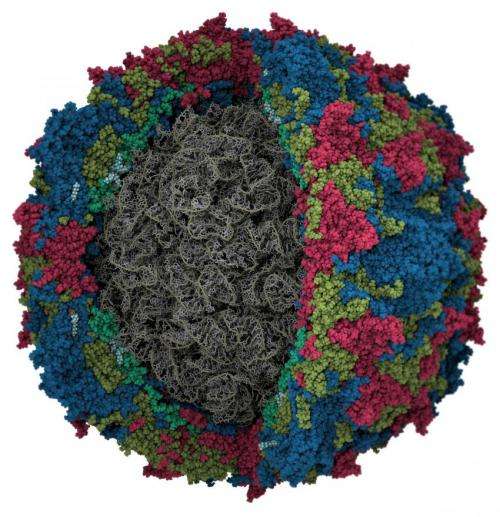Can we really eradicate polio?

In a world that is constantly changing, attempts to eradicate disease may be unrealistic, according to a commentary published by a UA geography expert.
Efforts at eradicating diseases may be doomed because of a mismatch between the ways humans structure the world and the ways pathogens move through the world, a team of University of Arizona geography experts writes in a commentary published in The Lancet Infectious Diseases, one of the world's most prestigious medical journals.
"The 2013 deadline for the worldwide goal to eradicate polio has come and gone, with a new endgame set for 2018," the authors note. They are Vincent Del Casino, Melinda Butterworth and Georgia Davis, all in the UA School of Geography and Development.
In 1988, the 41st World Health Assembly adopted a resolution for the worldwide eradication of polio. It marked the launch of the Global Polio Eradication Initiative, spearheaded by national governments, the World Health Organization, Rotary International, the U.S. Centers for Disease Control and Prevention and UNICEF with support from key partners including the Bill and Melinda Gates Foundation.
The commentary uses the deadline, and a resurfacing of the virus, as a springboard to addresses the big picture of how to understand and manage infectious diseases in a complex and changing world.
The timing of the commentary coincides with a blow to immunization efforts, including violent acts against health workers in Pakistan and Nigeria, where rumors persist that the polio vaccine is part of a Western plot.
"If you put all your energy into eradication, you miss opportunities for mitigation and management," said Del Casino, professor of geography and development and vice provost for digital learning and student engagement. "We hope to suggest that we can use polio as an entry point to a larger conversation about the spread of viruses more generally."
Unlike smallpox, poliomyelitis – a debilitating disease affecting the nervous system and causing permanent paralysis – has never been completely eradicated, Del Casino said.
"Smallpox eradication is rather unique and took a massive global effort, an incredibly expensive and coordinated effort that may not be possible with other infectious diseases."
According to the authors, one of the biggest challenges in ridding the world of polio is a mismatch in the way humans perceive and structure the world and the ways viruses – and, by extension, other pathogens – move through the world.
"The ways we believe the world is structured clash with the structure of the world that is relevant to the virus," Del Casino explained. "If we were to scale down our focus from the world of humans to the world of viruses, we'd end up in a different place in how we imagine the world and we'd start to think differently. Polioviruses don't need or rely on our view of the world. Their existence is based on human bodies and how to move from one to the next."
"In our society, we have a tendency to make sense of the world by organizing it into boxes," said Davis, a doctoral candidate in the School of Geography and Development. "We think certain pathogens occur here, but not there, and they get from this host to that host, and this is how they do it. But in reality, our attempt to understand the world by ordering it in certain ways may actually preclude us from really understanding it."
"Put another way," the authors write, "polioviruses maintain themselves by seeping through the boundaries – real or imagined – we use to contain them. In view of this, we need a more cautious approach to our thinking, and might need to reduce our expectations of global eradication efforts."
With Lyme, for instance, reporting happens on a county level, Davis said. On some maps, it appears that Lyme is endemic in one county but almost nonexistent just across the county border.
"It's the same for dengue fever," said Butterworth, also a doctoral candidate in the School of Geography and Development, who researches the mosquito-borne disease. "We're seeing a global resurgence of the virus, including several recent outbreaks in the U.S. Yet dengue is mostly thought of as a 'tropical disease,' so the diagnosis isn't always made."
"The issue of accurate testing and reporting of infectious diseases is a classic concern in health and medical science," Butterworth added. "But it matters for geography too, because it influences what our maps of disease distributions look like. Those maps influence how we understand where diseases are, and how we test for and monitor their spread."
The picture gets even more complicated in light of conflicts between people or entire nations, climate change and health care disparities.
"Climate and environmental changes alter the habitats of pathogens and vectors in ways we're still trying to understand," Butterworth said.
"Let's say a particular nation has vaccination programs, but a neighboring country doesn't, and yet another has them but can't enforce them uniformly," Davis explained. "Add migration to the mix and you can see how this creates holes for pathogens to move through and escape our ability to map them, let alone eradicate them."
The number of new polio cases has dropped dramatically, from 716 in 2011 to 223 in 2013, but more cases are cropping up.
"What is interesting is that, since 2013, which saw tensions in Somalia, the crisis in Syria, and a deteriorating situation in Afghanistan, there has been a creeping increase in cases," Del Casino said. "There almost was a chance to contain the virus, but it has become very difficult to contain those spaces, because viruses move faster than that."

















